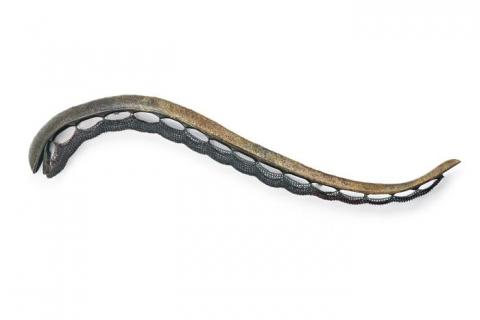CUIRASS, 1989
Bronwyn Oliver
bronze and copper
180.0 cm length
Private collection, Melbourne
Adelaide Festival of the Arts, Artspace, Adelaide, 1992
Moët & Chandon Art Fellowship, touring to the National Gallery of Victoria, Art Gallery of New South Wales, National Gallery of Australia, and Art Gallery of Western Australia, 1994
Bronwyn Oliver: Botanic, McClelland Gallery, Melbourne, 13 November 2005 – 5 February 2006
'Bronwyn Oliver had that rarest of all skills: she knew how to create beauty. Her art was fully resolved - perfect, really - and she stands alone in the annals of Australian art history. There was no-one like her: she invented her own deeply intelligent form, and entered fully into the world that it opened out to her...'1
One of Australia's most highly regarded contemporary sculptors, Bronwyn Oliver remains celebrated for her extraordinary ability to produce meticulously articulated works of immense beauty and grace which unite timeless, organic forms of the natural world with the abstract logic of geometry. Simple yet complicated, fragile yet strong, eccentric though at the same time oddly straightforward, her delicately woven copper and bronze assemblages such as Cuirass 1989 universally surprise and inspire - beguiling both the eye and mind through their enigmatic presence. With their tactility and anatomical physicality, such intricately executed forms moreover inevitably elicit a temptation to touch - the sensual, prehistorically-scaled versions of natural phenomena thus reminding us that the world is a corporeal place.
Yet too often the easy, voluptuous curves of Oliver's objects belie the punishing, labour-intensive process to which the artist was so passionately committed. Inspired by the patina of age and veneration shared by ancient relics and humble artefacts, Oliver would painstakingly manipulate dizzying twistings and welds of pliant copper wire to create the 'weave' - the microstructure of her organic sculptural forms which gradually became more open and geometric to allow light to permeate and exaggerate their optical aspect. Indeed, the shadows cast by her objects - whether flowing spiral and funnel shapes, calligraphic sweeping curves or seed and pod-like spheres - are so intrinsic to the formalist geometry of each piece that at times the shadow itself almost becomes more powerful' becomes the object.
As Amanda Rowell muses in her introduction to Oliver's exhibition at Roslyn Oxley9 Gallery in September 2004, 'the microcosmic, complex surface of an Oliver sculpture is an interface between the macroform of its overall shape and the internal cavity or void where the sculpture breathes. The ease of connection between these three formal aspects of her works, along with their gently mimetic character - as alluded by their titles - constitute their elegance and simple pleasure.'2
1. Fink, H., Bronwyn Oliver (1959-2006), introduction to exhibition catalogue, Roslyn Oxley9, Sydney, 10 July 2006
2. Rowell, A., Bronwyn Oliver 2004, introduction to exhibition catalogue, Roslyn Oxley9, Sydney, 9 September 2004
VERONICA ANGELATOS
